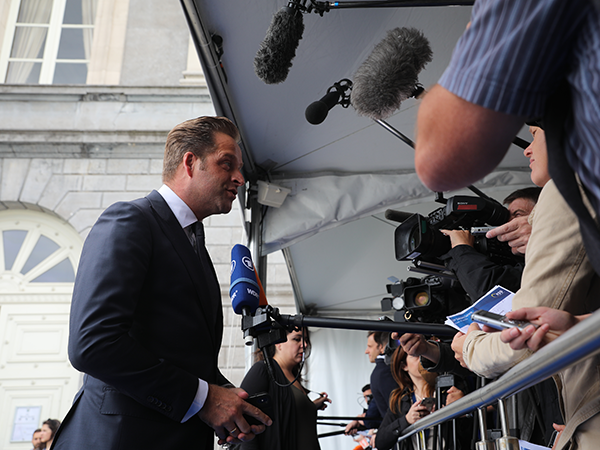The streaming hit that got us all through the early stages of the pandemic is back. Ted Lasso’s second season premiered on Apple TV+ July 23, and the heartfelt comedy has many coaches and leaders drawing on Coach Ted Lasso for leadership lessons.
For the uninitiated, Ted Lasso follows an American football coach who finds himself coaching association football at AFC Richmond in England. The club’s owner is determined to ruin the team – the only thing her vindictive ex-husband cares about – but even she is struck by Ted Lasso’s charm and sheer genuine humanity.
The day before the premiere, Jason Sudeikis – who portrays the titular coach – and Brendan Hunt – Ted’s assistant, Coach Beard – sat down with the TODAY Show’s Hoda Kotb. Sudeikis discussed the leadership lessons from Ted Lasso that have taken hold in the sports world and beyond.
“So much of [the show] is rooted in people that we’ve had as mentors or coaches, directors, partners, so leadership is a big part of the ethos of the show. So the fact that actual leaders are listening to us pretend leaders – we’ve really pulled one over on folks.”
One of the most prominent coaches to draw on Ted Lasso for leadership tips is Utah Jazz head coach Quin Snyder.
After the Jazz dropped the opening game of a playoff series, he invoked Lasso.
“Sometimes your favorite animal is a goldfish because it has a memory of ten seconds, and that’s where we need to be. We need to be moving forward and thinking about game two.”
Hunt told New York Times culture reporter Sarah Bahr that Snyder’s remark was “great.”
“That wasn’t the preseason press conference; that was before a playoff game. It was a high-pressure moment, but he took time to talk about our little skit. It’s pretty neat to think of.”
Indeed, this “little skit” offers ample leadership lessons, so just what can we learn from Ted Lasso?
Responding to Failure
AFC Richmond doesn’t always win, and indeed they suffer some heartbreaking defeats. However, the show models lessons to be learned from failures and triumphs alike.
Be Together
Don’t retreat into individual silos of sadness or anger. Work through it together.
“I want you to be grateful that you’re going through this sad moment with all these other folks. Because I promise you there is something worse out there than being sad – and that is being alone and being sad. Ain’t nobody in this room alone.”
Be Goldfish
Then, together, put the failure in the past and commit to moving forward stronger because of it.
TED: What do you think we should all do once we get done being sad and/or angry about this situation?
SAM, AFC Richmond Player: I think we should all be a goldfish.
TED: I agree. Let’s be sad now, let’s be sad together; and then we can be a gosh darn goldfish.
Note: The three clips that follow these, while equally wholesome, contain language stronger than “gosh darn.”
Next, Actually Move Forward
When you fall, “you can become 412 bones or you can land like an Avenger,” Sudeikis tells GQ senior staff writer Zach Baron.
Sudeikis says he prefers to land like an Avenger but notes that bones often heal stronger than they were before. Thus, he doesn’t want to “knock” those who don’t land like Avengers.
Have Some Perspective
The Avengers and bones analogies come from Sudeikis’ personal life. He went through a public breakup with his partner, actress and filmmaker Olivia Wilde. That split happened around the time Ted Lasso was filming.
Sudeikis tells Brown that their relationship will go from a “book” in his life to a “chapter,” then a “paragraph,” next a “line,” then a “word,” and finally a “doodle.”
Ultimately, the takeaway seems to be to not let a setback take up too much space on one’s personal journey. Eventually, a failure can become something like a doodle – meaningful, even beautiful, but still small so as not to define someone.
Believe in Yourself
It’s corny, but it’s true. Lasso adorns the AFC Richmond locker room with a sign reading “BELIEVE.”
His message has even reached the U.S. Men’s National Team.
Support Those Who are Hurting
Teams or organizations may collectively fail, but setbacks can impact people individually, particularly when they come on a public stage.
After England’s national team lost the Euro 2020 final in penalties, three players who missed kicks faced racist abuse. In response, Sudeikis wore their first names across his shirt at the Ted Lasso premiere in a show of support.
While not in character as Ted Lasso, Sudeikis still models the key leadership point of supporting one’s team through struggles.
Build Others Up
Supporting those who are hurting shows how to respond to setbacks and build others up. However, Ted Lasso shows true leadership by building his team up in good times and bad.
Look for the Best
Sudeikis tells Guardian writer Joel Golby that he didn’t want to “play a buffoon” or “humanize a bastard,” but instead wanted to play someone who is “looking for the best parts of life.”
Per Golby, Sudeikis traces this quality to his time as a retail sales associate, when he tried to understand that snappy customers were ultimately angry at something else in their lives, not him.
Understand Others
To encourage, support, and build up their teams, leaders must understand their team members. Ted Lasso shows some ways to embrace this key part of leadership.
Be Curious, Not Judgmental
In one of the most moving scenes of the series, Ted faces off against the vindictive ex-husband of AFC Richmond owner Rebecca Welton in darts. If Ted wins, Rupert cannot come to the owner’s box at games. If Rupert prevails, he will set Richmond’s starting lineup for the final two games. Ted is an expert darts player, but Rupert assumes otherwise.
All them fellas that used to belittle me – not a single one of ‘em were curious. You know, they thought they had everything figured out, so they judged everything and they judged everyone. And I realized that their underestimating [of] me – who I was had nothing to with it. ‘Cause if they were curious, they would’ve asked questions. Questions like, ‘Have you played any darts, Ted?’ to which I would’ve answered, ‘Yes sir, every Sunday afternoon at a sports bar with my father from age 10 ‘til I was 16, when he passed away.’
Have Empathy
Try to put yourself in others’ situations. In his Guardian interview with Golby, Sudeikis says that he has always empathized with the “boom guy” or “boom girl” on a TV set. He or she must hold a microphone high in the air to capture the sounds of a scene.
After Sudeikis and Golby hold their arms in the air for “about a minute” at Sudeikis’ urging, Golby concludes, “He’s right, it isn’t fun.”

Connect With and Motivate Others
Leadership often requires motivation, which itself requires connection – two traits Ted Lasso embodies well.
Open Up
Sudeikis starred in a series as a son with an ailing father, and that role touched Uproxx senior entertainment writer Mike Ryan. After Ryan discussed the loss of his father with Sudeikis in an interview about that series, Sudeikis sent him a note thanking him for sharing and extending his condolences.
In it, he notes, “It’s important and […] necessary for us human beings to do that. To connect. To share. And to not concern ourselves too much with the outcome of such bravery. Especially the men of the world.”
Have Humility
Ted Lasso understands that it’s not all about him.
Sudeikis, a onetime standup comic, tells Brown in his GQ profile, “Ego – that gets beaten out of you doing eight shows a week.”
Sudeikis’ character understands this as well.
After following Ted all day, icy reporter Trent Crimm (the Independent) cracks.
“If the Lasso way is wrong, it’s hard to imagine being right. In a business that celebrates ego, Ted reins his in. His coaching style is subtle. It never hits you over the head,” he notes in an article that Rebecca commissioned to undermine him.
Eventually, Ted’s charm melts the likewise icy Rebecca. Rebecca, too, shows leadership by admitting fault and seeking Ted’s forgiveness. Here, Ted Lasso demonstrates how leadership can rub off on others too.
Ted acquiesces with immediate forgiveness, and having won over owner and team alike, is set up for a comeback story in season two.
Thank you for reading this free IIFX content. We are working to help our members create a Fancentric fan experience – a 360º journey that begins in the homes of spectators, staff, and talent. You can join us on that journey by subscribing. Also be sure to sign up for our biweekly newsletter, the IIFXtra, to get a mix of exclusive and unlocked content as soon as we publish it.
[mailmunch-form id=”1036259″]

